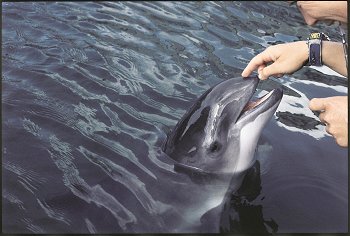Tag Archives: Holland
Porpoise in Holland becomes 2nd to give birth in captivity
Amber, a porpoise living at the Harderwijk dolphin centre in the Netherlands, has given birth to a calf this spring, making her the second porpoise ever to give birth in captivity.
Visitors are now gathering to come and see the calf, which has been given the name Kwin.
Picture is GNU
“Mum Amber and her baby, Kwin, are doing fine,” the centre said in a statement on Thursday.
The sex of the calf has not yet been determined and will continue remain unknown for several weeks. Another conundrum concerns the paternity of the calf. According to the dolphin centre, two male porpoises were swimming with Amber at the time of conception and any of them may be Kwin’s father.
The very first porpoise ever to give birth in captivity lives in Denmark where it had a calf in 2007 and the Harderwijk dolphin centre is now enlisting the aid of Danish porpoise keepers to make sure that baby Kwin is properly cared for.
“As we don’t know much about newborn porpoises, a team of Danish minders has come to help us,” the centre says in its statement.
The porpoise is a small ocean-dwelling mammal related to whales and dolphins. There are six recognized species of porpoise and their common ancestor is believed to have diverged from the dolphins roughly 15 million years ago. Porpoises are not as large as dolphins and have stouter bodies with small, rounded heads. Compared to dolphins, wild porpoises bear young more quickly and some species give birth to a calf as often as once a year. However, porpoises do not adapt to life in captivity as well as dolphins do and successful reproduction in zoos is therefore extremely rare.
